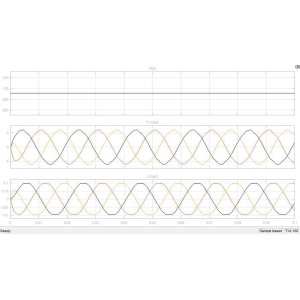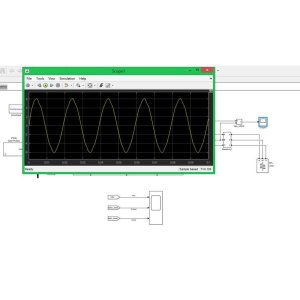Solar Power Optimization using Increment Conductance Ampibity Controller and PID Control
Problem Definition
This research project aims to address the issue of maintaining power efficiency and voltage stability in a solar power grid. The transition from solar panel power to grid power leads to power fluctuations, resulting in a power dip that compromises the stability of the voltage. This dip not only decreases the efficiency of power output but also poses a risk of damage to the system. The main focus of the project is to control these fluctuations and minimize the power dips to ensure a steady and efficient power flow. The limitations of the current system lie in its inability to effectively manage the transition between different power sources, leading to unstable voltage levels and reduced power efficiency.
By developing solutions to mitigate these issues, this research project seeks to optimize power flow and enhance the overall performance of solar power grids.
Objective
The objective of the research project is to address the issue of power efficiency and voltage stability in solar power grids by developing a system that can control fluctuations during the transition between solar panel power and grid power. By designing a system with a power injector equipped with a PID controller, the aim is to minimize power dips, ensure steady power flow, and prevent damage to the system. This approach involves using a combination of solar panels, an ampibity controller, an EV battery, and a residential load to detect and respond promptly to power fluctuations. The use of MATLAB software allows for precise modeling and evaluation of the system's performance, with the goal of demonstrating the effectiveness of the proposed solution in optimizing power flow and enhancing overall efficiency in solar power grids.
Proposed Work
The proposed research project aims to address the issue of power efficiency and voltage stability in solar power grids by focusing on controlling fluctuations during the switch between solar panel power and grid power. The main objective is to optimize solar power systems for increased efficiency and stability through the design of a system capable of mitigating power dips. The approach involves using a power injector equipped with a PID controller to introduce extra power during fluctuations, ensuring steady power flow and preventing damage to the system. By utilizing a combination of solar panels, an ampibity controller, an EV battery, and a residential load, the system aims to maintain stability by detecting and responding to power dips promptly.
The rationale behind choosing this approach lies in the need to create a sustainable solution that addresses the specific challenge of power fluctuations during the switch from solar power to grid power.
By utilizing a power injector with a PID controller, the system can respond quickly and accurately to fluctuations, maintaining voltage stability and efficiency. The use of MATLAB software allows for precise modeling and evaluation of the system's performance under varying conditions, providing a comprehensive analysis of the proposed solution's effectiveness. Through this project, the goal is to demonstrate the impact of the proposed system on reducing power dips and enhancing overall power efficiency in solar power grids.
Application Area for Industry
This project's proposed solutions can be applied across various industrial sectors where power efficiency and voltage stability are crucial, such as renewable energy, smart grids, electric vehicles, and residential energy systems. In the renewable energy sector, the system designed to mitigate power dips in a solar power grid can help ensure consistent power output and prevent damage to the system. In smart grids, the implementation of a power injector with a PID controller can enhance grid stability and efficiency. For electric vehicles, the system can optimize the charging process and improve battery performance. In residential energy systems, maintaining voltage stability can prevent disruptions and ensure a reliable power supply.
Overall, the benefits of implementing these solutions include increased efficiency, reduced energy wastage, and improved system reliability across various industrial domains.
Application Area for Academics
The proposed project can greatly enrich academic research, education, and training in the field of renewable energy systems and power management. The research addresses a critical issue in solar power grids, which can provide valuable insights into how to maintain power efficiency and voltage stability in similar systems. By developing a system that can mitigate power dips and ensure steady power flow, researchers and students can learn about innovative methods for improving the performance of renewable energy systems.
The use of MATLAB software and algorithms such as the Increment Conductance Ampibity Controller and PID controller provide a practical approach for implementing the proposed solution and analyzing its performance. This can serve as a valuable learning tool for students pursuing research in renewable energy systems, allowing them to apply theoretical concepts to real-world systems and data analysis.
The project's relevance in the field of renewable energy systems and power management makes it a valuable resource for researchers, MTech students, and PHD scholars looking to explore innovative research methods, simulations, and data analysis techniques. By studying the code and literature of this project, researchers and students can gain valuable insights into how to improve the efficiency and stability of solar power grids, potentially leading to advancements in renewable energy technology.
The future scope of this project includes the potential for further optimization of the power injection system and the exploration of additional algorithms for controlling power fluctuations in solar power grids. Researchers and students can continue to build upon this research by experimenting with different approaches and technologies to further enhance the performance of renewable energy systems.
Algorithms Used
The prime algorithm used is the Increment Conductance Ampibity Controller. This algorithm maximizes the solar power adaptation and ensures the optimal use of the solar panel. In addition, a PID controller is utilized for automated control of the power injection process, optimizing the performances under varying power conditions. The proposed solution involves designing a system capable of mitigating the power dips during the switch from solar power to the grid. This system involves a power injector that introduces extra power to control the fluctuation.
To achieve this, a solar panel with an ampibity controller for maximum power, an EV electric vehicle battery, and a residential load have been used. The power injector, equipped with a PID controller, injects power as soon as a dip is detected in the system, allowing it to maintain stability. Performance and efficiency of the system were evaluated based on the response from the battery side and residential side, under differing conditions.
Keywords
SEO-optimized keywords: Solar Power, Power Efficiency, Voltage Stability, Power Grid, Power Dip, Fluctuation, Power Injector, Ampibity Controller, MATLAB, PID Controller, EV Battery, Residential Load, Power Switch, Increment Conductance Algorithm.
SEO Tags
solar power grid, power efficiency, voltage stability, power dip mitigation, fluctuation control, power injector system, ampibity controller, EV electric vehicle battery, residential load management, PID controller, MATLAB software, increment conductance algorithm, renewable energy research, power grid optimization, energy storage solutions, solar panel performance, voltage regulation, sustainable energy systems.
| Shipping Cost |
|
No reviews found!




















































No comments found for this product. Be the first to comment!